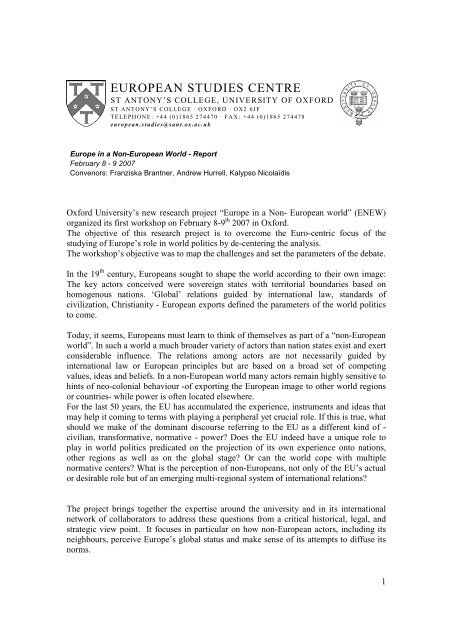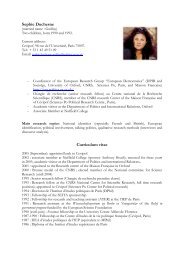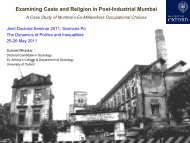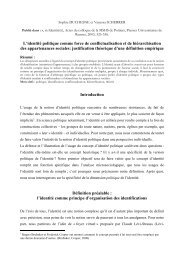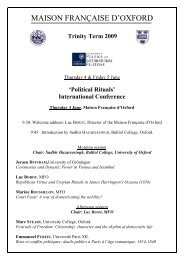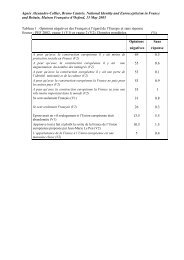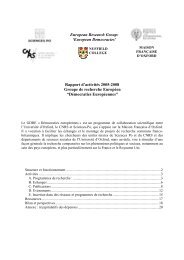european studies centre - The Oxford-Sciences Po Research Group ...
european studies centre - The Oxford-Sciences Po Research Group ...
european studies centre - The Oxford-Sciences Po Research Group ...
Create successful ePaper yourself
Turn your PDF publications into a flip-book with our unique Google optimized e-Paper software.
EUROPEAN STUDIES CENTRE<br />
ST ANTONY’S COLLEGE, UNIVERSITY OF OXFORD<br />
ST ANTONY’S COLLE GE · OXFO RD · OX2 6 J F<br />
T E LE PH ONE : +44 ( 0 ) 1 8 6 5 27 4 4 70 · FAX : +44 ( 0 ) 1 8 65 2 7 4 4 78<br />
euro pean.s tudies@sa n t.ox .ac.uk<br />
Europe in a Non-European World - Report<br />
February 8 - 9 2007<br />
Convenors: Franziska Brantner, Andrew Hurrell, Kalypso Nicolaïdis<br />
<strong>Oxford</strong> University’s new research project “Europe in a Non- European world” (ENEW)<br />
organized its first workshop on February 8-9 th 2007 in <strong>Oxford</strong>.<br />
<strong>The</strong> objective of this research project is to overcome the Euro-centric focus of the<br />
studying of Europe’s role in world politics by de-centering the analysis.<br />
<strong>The</strong> workshop’s objective was to map the challenges and set the parameters of the debate.<br />
In the 19 th century, Europeans sought to shape the world according to their own image:<br />
<strong>The</strong> key actors conceived were sovereign states with territorial boundaries based on<br />
homogenous nations. ‘Global’ relations guided by international law, standards of<br />
civilization, Christianity - European exports defined the parameters of the world politics<br />
to come.<br />
Today, it seems, Europeans must learn to think of themselves as part of a “non-European<br />
world”. In such a world a much broader variety of actors than nation states exist and exert<br />
considerable influence. <strong>The</strong> relations among actors are not necessarily guided by<br />
international law or European principles but are based on a broad set of competing<br />
values, ideas and beliefs. In a non-European world many actors remain highly sensitive to<br />
hints of neo-colonial behaviour -of exporting the European image to other world regions<br />
or countries- while power is often located elsewhere.<br />
For the last 50 years, the EU has accumulated the experience, instruments and ideas that<br />
may help it coming to terms with playing a peripheral yet crucial role. If this is true, what<br />
should we make of the dominant discourse referring to the EU as a different kind of -<br />
civilian, transformative, normative - power? Does the EU indeed have a unique role to<br />
play in world politics predicated on the projection of its own experience onto nations,<br />
other regions as well as on the global stage? Or can the world cope with multiple<br />
normative centers? What is the perception of non-Europeans, not only of the EU’s actual<br />
or desirable role but of an emerging multi-regional system of international relations?<br />
<strong>The</strong> project brings together the expertise around the university and in its international<br />
network of collaborators to address these questions from a critical historical, legal, and<br />
strategic view point. It focuses in particular on how non-European actors, including its<br />
neighbours, perceive Europe’s global status and make sense of its attempts to diffuse its<br />
norms.<br />
1
February 8<br />
<strong>The</strong> Clash of Universalisms - Or why Europe needs a post-colonial Ethos.<br />
Kalypso Nicolaïdis, Director, European Studies Center, <strong>Oxford</strong><br />
Kalypso Nicolaidis started off the workshop by critically analyzing the EU's universalist<br />
discourse – or “EU-niversalism”. She tackled the normative European universalist<br />
discourse which seeks to establish itself against that of the United States – Kantian<br />
republicanism that inspires the EU versus the US's liberal tradition grounded in both<br />
Hobbes and Locke; Europe’s social capitalism vs. US liberal capitalism; Europeans as<br />
natural custodians of the earth as opposed to the US and its “death culture”; and finally<br />
Europe's superiority in terms of understanding complexity, its inconclusiveness and<br />
culture of doubt vs. the dogmatic and naïve American version of for example democracy<br />
promotion. Nicolaidis emphasised that such “clashes” are too often mischaracterised on<br />
essentialist grounds, over-generalising and failing to recognize internal diversity on both<br />
sides. But above all, the consequences of such “othering” might backfire when the EU<br />
attempts to establish its role in a “non-European” world. Recognizing the need for a<br />
galvanizing story for Europeans’ role in the world, her recommendation is to establish as<br />
“the other” Europe’s own colonial past. Nicolaidis suggested that if some variant of<br />
European universalism is to survive and fit with competing discourse emanating from the<br />
rest of the (decolonised) world, it must find a path between echoing its historical legacy<br />
of “standards of civilization” and pure relativism.<br />
Mapping Globality: A Historical Perspective<br />
Karoline <strong>Po</strong>stel Vinay, Senior <strong>Research</strong> Fellow, Centre d'Etudes et de Recherches<br />
Internationales (CERI), <strong>Sciences</strong> <strong>Po</strong> Paris<br />
Karoline <strong>Po</strong>stel Vinay continued the discussion by addressing the process by which the<br />
international system became “global”. She focused on the notion of “globality” (different<br />
from universality and international). Globality refers to world orders and how world<br />
orders turned “global”. In the 19th century, with the ambition of Weltpolitik, came a<br />
change of scale of European power politics and the geo-political “globality” as<br />
legitimized concept and relevant framework for the analysis for international action. This<br />
European consciousness of globality challenged non European world orders. For the<br />
Chinese world order for example, <strong>Po</strong>stel Vinay argued that European “globality” did not<br />
only pose a relative but an absolute challenge – the sino-centric world was no longer the<br />
world, but part of the world, of (European) globality. <strong>The</strong> former “barbarian”/non-world<br />
was integrated into the “one world order”, though of course clear hierarchies between<br />
different parts of the one world were the direct consequence. Europeans decided which<br />
parts were “relevant” - or not. After the Europeans had set the stage for “globality”, the<br />
Americans wrote the plot: President Woodrow Wilson framed the discourse as a ‘world<br />
war of freedom against tyranny’. An example for this American plot/narrative is how the<br />
“Great War” turned into a “World War”, and the 1939-1945 war, a second "World<br />
War"”, thereby often supplementing or replacing local and regional historical contexts of<br />
the wars of the 20th century with global contexts. <strong>The</strong> following “Cold War” narrative<br />
2
was contested as a global narrative (North-South narrative); whereas the two currently<br />
existing narratives of “globalization” (as world order and not as moment in history of<br />
human exchanges) and the “war on terror” have not yet found other challengers than the<br />
narrative of the Islamic Umma. What role for a (new) European narrative in a non-<br />
European world?<br />
February 9<br />
Norms and preferences in a globalized word: what Europe stands for?<br />
Zaki Laïdi, Senior <strong>Research</strong> Fellow, CERI, <strong>Sciences</strong> <strong>Po</strong> Paris<br />
Mark Leonard, Director, Open Society Initiative for Europe<br />
Zaki Laidi started his presentation by criticizing Manners’s normative power approach<br />
for its lack of critical distance between what Europe stands for in principle and what<br />
Europe does as actor. Thus, Laidi proposed to contain this tendency by linking the notion<br />
of norm to the notion of preferences. <strong>The</strong> EU does not stand for abstract values, but for<br />
those that reflect social preferences that are imbedded in European societies, which do<br />
evolve over time. <strong>The</strong>se preferences furthermore reflect European interests, which the EU<br />
promotes and defends.<br />
Nevertheless, Europe will not become a classical superpower because Europeans do not<br />
regard themselves as the ultimate guarantors of their own security and because Europeans<br />
do not define politics in terms of “friend and foe”, the ultimate goal is not “victory”.<br />
Europeans refuse power politics, realpolitik and the assumptions of power politics (they<br />
believe in interdependence and global governance). As we are assisting in the comeback<br />
of power politics, this refusal and “non equipment to deal with power politics” threaten to<br />
weaken Europe.<br />
Mark Leonard agreed with Laidi that norms reflect interests; in addition, in the European<br />
context, the postulated norms are a surrogate for agreeing on interests. Member states do<br />
hide behind norms when they cannot agree in purely “interest terms”.<br />
He then drew a scenario for the next 15 years suggesting that we should expect the return<br />
of ideological struggles. He argued that the obvious shift in economic power will be<br />
overlaid by ideological shift over world order; he foresees networks of countries united<br />
by ideas about how the world should be run; countries will align according to them being<br />
either democratic or autocratic and according to their support for “power” or “law”.<br />
For example, regarding the US, he argued that the US is a democracy but will invest less<br />
in international institutions; for the US, power will trump law. This battler over<br />
ideologies will bring a new balance of soft power and a global battle to co-opt swing<br />
states, e.g. Caucasus, South East Asia, or India. <strong>The</strong> EU should learn to exploit the<br />
differences within other countries, e.g. support the environmental lobby and<br />
multilateralists in the US. <strong>The</strong> EU should continue to create international institutions that<br />
embody its values –ICC , Kyoto –and “bully” other countries to accept its values. But in<br />
the end, the vision for the EU is to embody “reciprocal altruism”.<br />
3
European power in a multipolar system: How does Europe project its values,<br />
policies and standards?<br />
Lord Michael Jay of Ewelme, House of Lords<br />
Laurence Whitehead, Official Fellow in <strong>Po</strong>litics, Nuffield College, <strong>Oxford</strong><br />
Michael Jay followed up on Leonard’s challenge by elaborating how Europe could adapt<br />
to the changing conditions. He emphasized that the values espoused and projected are<br />
those in the preamble of the Treaty of Rome: rule of law, democracy, human rights. He<br />
then, based on his long-standing experience in the international arena, developed upon<br />
how others see the EU. According to him, it is a mixed picture, depending on who you<br />
talk to and what they see us doing. In Washington, the EU has low visibility as such,<br />
except on trade issues where the EU causes irritation, but of course high visibility of the<br />
member states and no visibility of EU as such outside DC. In Asia, the EU is still<br />
recognized as trading power, but also seen as an aging, uncompetitive economic bloc.<br />
Often, countries from that region, as well as Gulf States, are interested in Europe’s role in<br />
conflict resolution—regional groupings helping to resolve sub-regional conflicts.<br />
Jay furthermore argued that increased economic competitiveness of the EU is essential<br />
for its continued ability to project its values abroad.<br />
Laurence Whitehead elaborated on the intriguing question why the EU’s non-coercive<br />
approach worked better in Central America than in the Balkans. In the San Jose process,<br />
the EU projected its values in a non-coercive way, it applied in its policies the principles<br />
the EU is standing for and its willingness to stand by and support the transition towards<br />
democracy. He then described how the ACP – EU relation projects on the ACP countries<br />
what the EU is, e.g. how the EU Commission interacts with the ACP secretariat, despite<br />
the low legitimacy and accountability of the ACP secretariat.<br />
Finally, he highlighted that policies within the EU are as important as external policies,<br />
for example immigration policy and its consequences on how non-Europeans perceive<br />
the EU.<br />
General overview of the debate<br />
<strong>The</strong> challenge the project faces is to understand Europe in the light of what others look<br />
for. We cannot seriously understand what we are standing for if we do not compare it to<br />
what others stand for. If we follow the trend of describing our values/norms as driven by<br />
“good” and that others have to comply –the risk is high of replicating European policies<br />
of the 19 th century.<br />
Furthermore, “inside” and “outside” have become increasingly blurred because<br />
globalization challenged the disctinction between internal and external policies as well as<br />
their meaning for different actors.<br />
4
<strong>The</strong> following themes and questions emerged during the workshop and will be part of the<br />
future discussion of the project:<br />
Universalisms<br />
- What “universalisms” can we find? How do they relate to each other? (historically<br />
and in the present) How does the EU fit in or not?<br />
- How do actors in different countries interact with “universal” norms?<br />
- When is universalism legitimate in the eyes of others? How to achieve that<br />
“states” implement “universal” values?<br />
- How do non-Western, non-colonized powers engage with the European<br />
universalist narrative?<br />
- Is the critique of the EU universalist project all about the how? or also the what?<br />
- Who feels empowered in other countries through the EU (discourse, policies,<br />
model etc.), what internal dynamics and distributions does this spin off?<br />
Global order and multipolarity<br />
<strong>Po</strong>wer and governance – risk of putting them in separate boxes. It is not a coincidence<br />
that the current power challenges coincide with governance challenges. <strong>The</strong> emerging<br />
powers themselves are at these cross points. Law is also not only there to engineer global<br />
governance, but also to protect sovereignty.<br />
- How are other regional powers/networks of powers constructed?<br />
- Multipolarity- how do other centers design the global order? And what role do<br />
they assign (or not) to the EU?<br />
- How do the different centers of power (among which Europe is one) engage with<br />
each other?<br />
- Can there be a plurality of world orders? Or one world order, which determines<br />
which parts of the world matter and which ones not? Does the talk about “global<br />
governance” necessarily require hierarchisation and fragmentation not only<br />
between regions, states, but also non-state actors?<br />
- Alliances: what are current international alliances that effectively manage power<br />
distribution? How does the EU fit in or not? How do they relate to the EU or not?<br />
Global order and multilateralism<br />
- What are the “multilateralism” visions of emerging powers? What role do they<br />
assign the EU in their vision?<br />
- How do “non-European” powers and emerging powers inside international<br />
organizations engage with the EU, how does it impact its promotion of its<br />
preferences? How do these interactions change due to changing power realities?<br />
How does the EU adapt, or not?<br />
5
- Dependence on international institutions- how do countries judge their relative<br />
dependence on international organizations compared to the EU’s dependence on<br />
them?<br />
- Do differences in willingness to pool sovereignty reflect difference over interests,<br />
or something more fundamental e.g. are EU member states generally more willing<br />
to pool sovereignty than non European actors?<br />
- Have the Europeans mystified the story of sovereignty pooling and global<br />
governance, e.g. have the Europeans been able to overcome sovereignty because<br />
they invented it and because they continue to have the strength of the state?<br />
European preferences and global norms<br />
- Under what conditions can Europeans translate their preferences into generalized,<br />
even global norms?<br />
- Do others perceive a difference between European “preferences”, “norms” and<br />
“political action”?<br />
- Can the EU continue to act as a “structuring power” (the EU creates the structures<br />
that impose preferences and norms). Eg. with the enlargement the EU imposed its<br />
norms- and structured its neighborhood. Does the EU want to do the same for the<br />
rest of the world? Does the rest of the world want Europe?<br />
- Other ways of translating preferences into norms: EU presses countries to join the<br />
international institutions they value, pushes to increase the web of international<br />
institutions, and embeds preferences into codes of conduct, e.g. Russian energy<br />
charter.<br />
- What is the place of power in this translation? (need for more sophisticated<br />
understanding of attraction versus coercion, e.g. hard coercive power through<br />
internal market)<br />
- What are the points of interaction between EU and outside actors? How are these<br />
structured (also in terms of power asymmetries)?<br />
- How are US/EU extra-territorial policies perceived and acted upon<br />
comparatively?<br />
- <strong>Po</strong>wer asymmetries are an important aspect of “transformative power EU”. Are<br />
power asymmetries nowadays too weak to allow for transformative power of the<br />
EU? How does the EU adapt to these changing power asymmetries? How do<br />
others adapt to changing centers of power. Does the EU try to write power<br />
asymmetries or magnify them in its interactions?<br />
- If interests of EU and norms of others conflict, where do we go?<br />
Regionalisms<br />
- What “regionalisms” can we find? How do they relate to each other? (historically<br />
and currently)<br />
- Comparative regionalism to study levels of governance, e.g. the EU process and<br />
governance toolbox (Q: if only the process and easier to export because not<br />
6
contentious, so how should it be then our identity? If it is not boring for us, e.g.<br />
enough for our identity, why do we think it is easier to export?)<br />
- EU as laboratory, rabbit for regional integration/global governance<br />
- EU is not only model –there are many others (e.g. NAFTA for questions of hard<br />
borders)<br />
- To what extent and in which areas is the EU a reference point for others?<br />
- Global governance ---informal groups of big states within and around global<br />
institutions –alliances (see regional alliances)<br />
Franziska Brantner, February 23 rd 2007<br />
7
Participants<br />
Jean Aitchison<br />
Othon Anastasakis<br />
Gulnur Aybet<br />
Andrea Baumann<br />
Dimitar Bechev<br />
Christoper Bickerton<br />
Sarmila Bose<br />
Richard Caplan<br />
Frederic Charillon<br />
Anne Deighton<br />
Reinhard Duessel<br />
Matthew Eagleton-Pierce<br />
Nora Fisher<br />
Paul Flather<br />
Rosemary Foot<br />
Heather Grabbe<br />
Benjamin Habig<br />
Carolyn Haggis<br />
Florian Hoffmann<br />
Nino Japaridze<br />
Michael Jay<br />
Lee Jones<br />
Michael Kaser<br />
Markus Kornprobst<br />
Nadiya Kravets<br />
Julia Labeta<br />
Zaki Laidi<br />
John Law<br />
Hartmut Lenz<br />
Tobias Lenz<br />
Mark Leonard<br />
Kerem Oktem<br />
Louis Pauly<br />
Karoline <strong>Po</strong>stel-Vinay<br />
Jochen Prantl<br />
Philip Strik<br />
Stefan Szwed<br />
Christian Tuschhoff<br />
Juri Viehoff<br />
Leïla Vignal<br />
Stephen Weatherill<br />
Laura Whitehead<br />
Xiaofeng Yu<br />
Berenika Zakrzewski<br />
8


